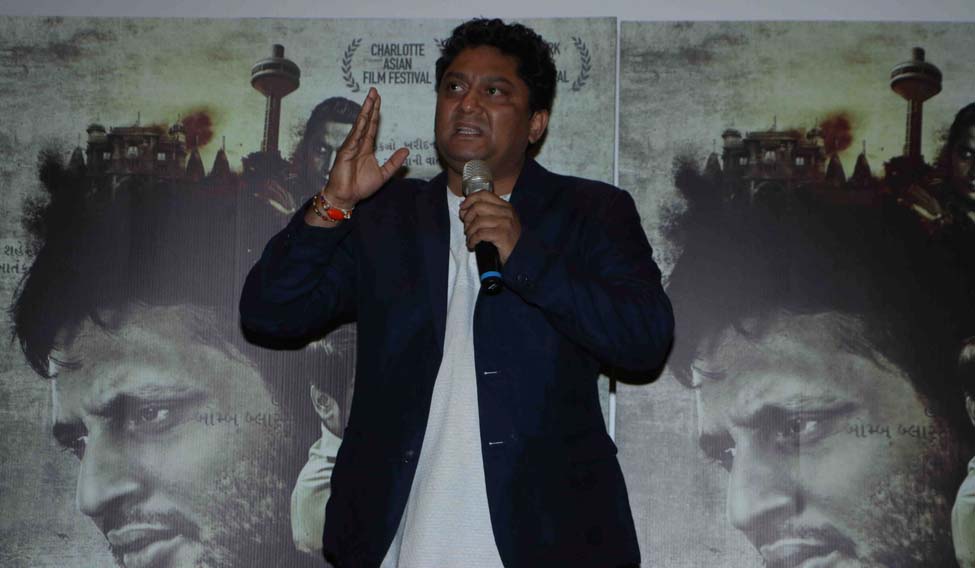Just after the serial blasts in Ahmedabad in 2008, documentary filmmaker Dakxin Chhara, who was documenting the post-blast scenario in the city, was struck with an idea. While working on it, he had met a lot of victims including a little boy, Mohammad Ismail, who used to sell water pouches during summer. He was one of the victims of the blast. Chhara was interviewing the kid’s father when Ismail lost his life. The immediate thought was if terrorism can solely be associated to a religion.
That germ of an idea wouldn’t leave Chhara. He wanted to explore it further and started researching on the subject. “There were too many perspectives to be explored, especially about violence and its association to economy,” Chhara recalls at the trailer launch his debut feature, Sameer, also clarifying that though inspired by the blasts of 2008, it is not based entirely on it.
It wasn’t easy for him to pursue the dream of making his first feature film, especially when even friends discouraged him. Mentioning one such incident when he shared the script with a close friend, also a newspaper editor, more than two years ago, he was discouraged with a response that said: “This is a right film at the wrong time, so don’t make it.” And exactly for that reason, he wanted to make the film. It then became a journey of two years.
The film explores the life of a young and innocent Muslim engineering student, Sameer, who is taken into custody by the Anti Terrorism Squad (ATS) and is forced to help the ATS in their mission to find his roommate Yasin, the mastermind behind the Hyderabad and Bengaluru blasts, before he strikes again in Ahmedabad.
Chhara, quite candidly, in what seems like mocking the government, says that somewhere we all are aware of the times we are living in. "It is a time when perceptions are being fed and mindsets are being created. To break that, art can be an answer. Film being one of the most important medium,” he says adding that his film was capable of breaking the wrong perceptions being created.
While he is satisfied with the result, it was a harrowing time that he had to go through. With the film, Chhara realised how there was another journey one had to take after making a feature film. “Releasing it is a completely different ball game. It is a painful exercise,” says the director, without mincing words about the difficulties he had to face at the hands of the Central Board of Film Certification. “The board created a controversy even before the film released,” he says pointing to the brouhaha earlier this year in March when the film was taken for certification and CBFC wanted some of the film’s dialogues like “Dilli ka raasta UP hokar jaata hai”, and “Ek mann ki baat kahun...” to be cut; the latter because it includes the title of PM Modi’s radio show, Mann Ki Baat.
“They thought that I am criticising a particular politician, Modi sahab to be precise. But even if I am doing it, that is my right as a citizen of this country. I have freedom of expression which the Constitution has given me,” he says, also adding that the Cinematography Act says that the evaluation should be done keeping the context of the dialogue in perspective, “and not look at it in bits and pieces. But I guess, the board has got used to looking at things in bits and pieces.”
He had to bear the brunt. He asserts that because of all this commotion, the film is delayed by almost six months as to get a certificate; he had to approach the FCAT. “Even the FCAT suggested quite a few cuts that included some wonderful dialogues too. But I am glad that the narrative remains intact even after that.”
As opposed to the seven cuts that the CBFC examining committee had suggested, FCAT retained only two; however, they asked for the removal of six dialogues and a scene that involved violence.
The film features Zeeshan Ayyub in the titular role along with Anjali Patil, Subrat Dutta and Seema Biswas. Ayyub says it is a film which is very close to his heart. “Dakxin has taken a serious issue of our times and told it beautifully and powerfully onscreen. Moreover, it was very challenging to get under the skin of this character as he is in a very vulnerable spot, but at the same time we do not lose sight of his humanity. I am very hopeful that the audience will appreciate our efforts in telling this important story."
The film is slated for a theatrical release on September 15, 2017.






